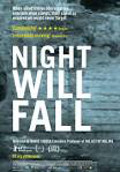
Directed by
Andre Singer
75 minutes
Rated MA
Reviewed by
Sharon Hurst

Night Will Fall
Synopsis: In 1945 work began on a film documenting the liberation of the Nazi concentration camps. Although that film was never completed, years later Andre Singer has edited six reels of footage into this harrowing documentary that is about the atrocity and about the history of the film itself.
When the Nazi concentration camps were liberated, soldiers from the Russian, American and British armies were sent in with movie cameras. The aim was to make a film that would prove to the world the veracity of what happened in those camps. The footage was shot with the intention of making a detailed visual record called German Concentration Camps Documentary Survey. A team of film-makers, including Sidney Bernstein, Richard Crossman and, surprisingly, Alfred Hitchcock worked tirelessly, editing and collating, with the aim of showing the world the truth. But politics intervened, reconciliation and rebuilding were higher on the priority scale and the film was canned. Billy Wilder subsequently made a far less confronting film. Death Mills, that did get a release, bur the original footage from Bernstein’s unrealised film languished for decades. Until now.
What the liberating armies saw was beyond all imagination. Yes we’ve seen a lot of this stuff before, but NEVER in such disturbing and horrific detail. As an audience, it feels almost voyeuristic to look at this stuff – naked, skeletal emaciated bodies being carted over shoulders like pieces of meat and thrown into pits, corpses strewn like wreckage, human ribcages semi-burnt in crematoria . . . need I say more? And yet it is so important in many ways to look at this to remind oneself this is ultimately where prejudice and hatred can lead.
Footage from many of the most notorious death camps is included – Majdanek, Dachau, Auschwitz, Buchenwald, Bergen Belsen - famous names that we all recognize but this doco shows us the reality behind those names. Often the camps were situated close to pretty peaceful villages where camp officers were quartered and children played. Did the locals really not know what was happening or were they turning blind eye to the horror?
There are more recent interviews with survivors of the camps, including one woman who was a twin and recalls her experiences at the hands of the nightmarish Josef Mengele. Other old men, who were actually behind the cameras in 1945 tell of feeling like they had “peered into hell” – and weep still today as they think of images they claim to never be able to forget. The producer of Schindler’s List, Branko Lustig, himself a child survivor of Auschwitz also gives his reminiscences.
Director Singer was involved in the production of the confronting film about atrocities in Indonesia, The Act of Killing, and is obviously disturbed by the human propensity for unthinkable cruelty. Indeed, although films of this nature are deeply upsetting and almost unbearable to watch, they are critically important. As narrator Helena Bonham-Carter says, “unless the world learns, night will fall”.

Want more about this film?


Want something different?




